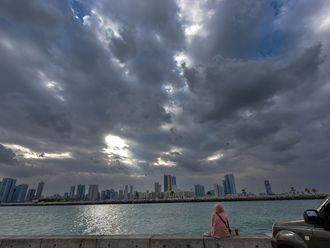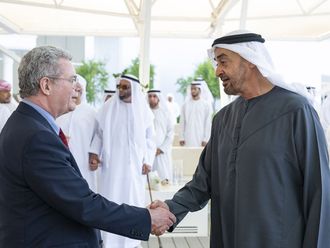The 14th summit of the Arab League convened in Beirut this week. Several issues were on the summit's agenda, including Saudi Crown Prince Abdullah's initiative for peace in the Middle East, the U.S. threats against Iraq, and the Iraqi-Kuwaiti situation. The summit has assembled even as the Israeli aggression against Palestinians continues, Israeli Prime Minister prevents Arafat from attending the meetings, and thousands of Arabs demonstrate in different Arab countries against the Israeli aggression on Palestinians. Huda Fawzi of the Gulf News Research Centre reviews the discussion of the summit by the Arab Press.
Ahmad Omrabi writes in Al-Bayan (UAE) that what makes this summit distinctive is not the unanimous consensus of Arab leaders on a clear peace proposal that is directed at Israel. What makes it distinctive is whether Arabs can adopt a firm punitive plan to counter Israel if it rejects the peace proposal.
He adds that prior to the summit, Israel had declared that the withdrawal that it will consider is a partial and not a complete one. Yet the proposal talks about full withdrawal from the Arab lands that were occupied in 1967.
Moreover, the spokesman of the Israeli Prime Minister has revealed Israel's interpretation of the UN resolution No. 242, saying that it mentioned in its text the expression "Arab lands" and not "The Arab lands". In this way, Omrabi notes, Israel is hinting at reasons for expanding its occupation.
Consensus
It is obvious that the Israeli leaders believe that the Arab peace proposal is not supported by a powerful force. For this reason the Arab nations are not looking for Arab consensus on the peace initiative but on the punitive measures that the Arabs will take if Israel rejects the proposal, taking into consideration the current status of the Palestinian resistance that has been escalating, concludes Omrabi.
Akhbar Al Arab (UAE) says in its editorial comment that the Arab World was annoyed by Sharon's refusal to allow Arafat to attend the summit. Such a stand has insulted an Arab leader, humiliated the Arab summit and undermined its decisions.
Preventing or permitting Arafat to attend the summit is not a temporary tactic that aims at an instant gain because that is not the traditional practice and policy of the Israeli government.
Rather, Israel aims at sending a message to the Palestinians, the Arab leaders, and countries that sympathise with the Palestinians that it will never offer any concessions that harm its colonisation projects in the occupied lands whatever the amount of pressure put on it, adds Akhbar Al Arab.
Global focus
Israel also wants to draw the world's attention to its claims that Arafat has not fulfilled what it demanded from him, starting with stopping the Intifada to detaining all those who are accused of resisting the Israeli occupation. It appears to be provoking the Arab leaders to adopt strict stances against Sharon's policies and thereby bury the Saudi initiative, says Akhbar Al Arab.
Sharon has offered the Arabs a blank cheque to record on it their firm position on regional issues, including supporting the Intifada, rejecting any threat against Iraq, a balanced stance in relation to combating terrorism starting with a correct definition of the term, and nuclear weapons in the Middle East. Arafat's place right now is definitely in Ramallah, beside his people and warriors, which is more beneficial to him and to the Palestinian cause, concludes Akhbar Al Arab.
Public opinion
Discussing public opinion of the Arab summits, Dr Basyouni Ibrahim Hamada writes in Al Khaleej (UAE) that most of the Arab public, not just the intellectuals, believe that the decisions passed in the summits are a result of external pressure. Moreover, Arab stances are disunited in spite of the common language, culture, civilisation and historical background, which are the basic factors for successful unity, says Hamada.
The public also believes that the decisions about Israel are mostly ones of condemnation and indignation and those regarding other Arab issues are repetitive declarations, all of which only reveal political positions and emotional support, while most of these decisions cannot be implemented. Some examples are the Joint Defence agreement, the common Arab market, and the Arab court of justice, adds Hamada.
They think that the League did not make use of all its political cards regarding the Arab-Israeli conflict since it stuck to peace as a strategic solution.
This, in turn, lessens the opportunities for negotiation and freezes the mechanisms through which the crisis can be managed. Also, the League deals with the Palestinian cause as a mediator and not as a partner. In general, the philosophy of the summits is based on curative measures, not preventive ones, says Hamada.
Bridging gap
To bridge the gap between public opinion and the direction of the summits, the Arab League should adopt several principles. These include dealing with the Palestinian cause as a partner, making use of all options that lead to establishing the Palestinian state with Jerusalem as the capital, and the return of refugees.
The League should rely on Arab forces and not an external power to solve the Palestinian conflict. It should support the Palestinian resistance through new and creative methods, bearing in mind that peace initiatives cannot be implemented if there is no power to protect them and force the Zionists to accept them, adds Hamada.
Pressure
Moreover, the League should use all sorts of practical pressure tactics against those that support Israel so that the West feels that their interests are endangered when they aid the Israeli aggression.
It should be understood that the partial withdrawal of Israel and the U.S. pressure for the establishing of a Palestinian state are mere tactics that aim at hindering a decision that protects Arab rights. In essence, no amount of declarations of condemnation and indignation against Israel will be sufficient for the Arab people, as they want their objectives to be fulfilled, including establishing the Palestinian state and the return of refugees, notes Hamada.
Thrilling event
The summit is a thrilling event that is being followed closely, says Ali Ibrahim in Asharq Al-Awsat (based in UK). In this respect, demonstrations of thousands in more than one Arab country have revealed the people's concerns and demands that reflect their high expectations.
However, there is no similarity between these demands and the objectives of the summit, says Ibrahim.
While some demonstrators don't want to discuss peace with Israel at all, others want the borders to be opened so that weapons can be sent to the Palestinian resistance since it is impossible to send armies. In general, all such demands lead to a declaration of war, says Ibrahim.
Those who espouse such slogans know that they are not feasible for several reasons. First, the policies of the countries convening at the summit are directed towards peace as a strategic solution.
Second, evaluating the regional and international situation leads to a course t
Beirut summit reflects Arab aspirations
Ahmad Omrabi writes in Al-Bayan (UAE) that what makes this summit distinctive is not the unanimous consensus of Arab leaders on a clear peace proposal that is directed at Israel.












